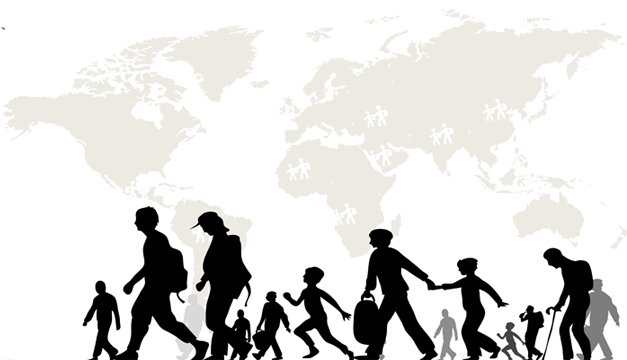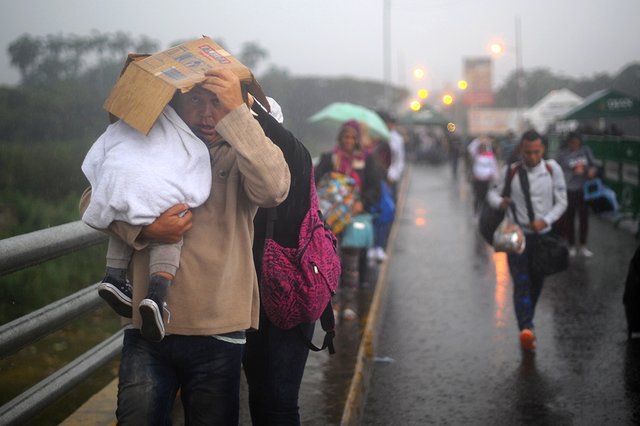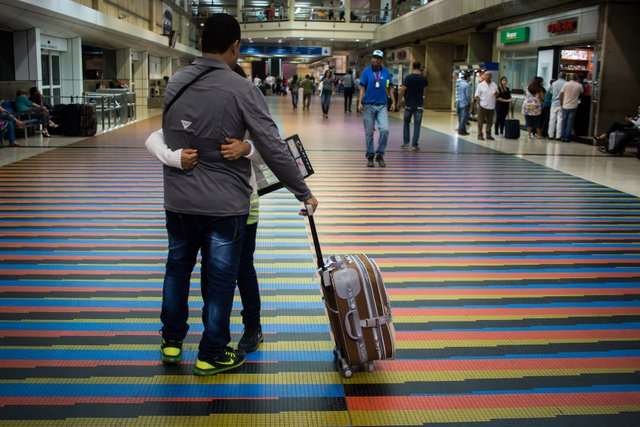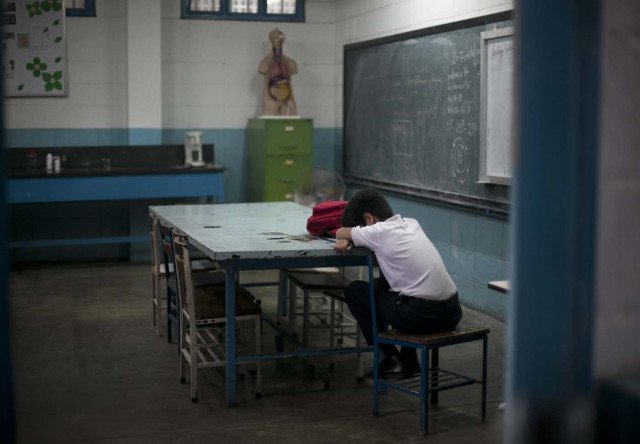ADSactly Society: Behind the Migration
 link
linkMigration in Venezuela in recent years has grown impressively. This is mainly due to the difficult economic, political and social situation in the country. For many, one option is to seek quality of life in other countries, leaving behind their lives, dreams, friends and families. This sad reality today is affecting many Venezuelans.
 link
linkThe International Organization for Migration (IOM), in conjunction with the United Nations Relief and Works Agency (UNHCR), reported that by 2019 it is estimated that the migration of Venezuelans fleeing the crisis in their country will increase by 55%.
According to these figures, it is known that a large number of Venezuelans who have emigrated from the country have settled in different nations in Latin America and the Caribbean. These statistics show an important crisis in the oil nation. Uncertain living conditions are warned for those who decide to emigrate, doing it in many occasions in an improvised way, without a life plan that allows them to adapt quickly to the country in which they wish to settle.
The consequences of this situation never experienced before in the history of Venezuela, has generated infinite consequences such as the defragmentation of families and couples, with the suffering, uncertainty and stress they imply: In the new place, it faces the change of culture and status, among others. What is known as "migratory mourning" is manifested, not only for those who leave, but also for those who stay and feel the absence of their loved ones.

link
Particularly, I consider it worrying how this situation has generated the disintegration of many families. As a school teacher in Venezuela, I have experienced very closely the mourning of the children "left behind", who express, on various occasions, rebellion, anger and sadness until they reach depression, for having been left in the care of their grandparents or a relative, or even in the care of a neighbor. Feeling abandoned by their parents, generates in them stress and various emotions such as mood swings, isolation, low academic performance, even disobedience to their temporary custodians, situations they do not know how to control, and even less if you do not have professional support.
This circumstance worsens every day and becomes a serious problem. There is a worrying increase in the statistics of children living on the streets, exposed to any kind of abuse, who are not adequately supervised.
This scenario is known as "The children left behind", which the United Nations (UN) uses to refer to children who are at risk of not being included or protected by the society in which they live, a consequence that can bring emigration.
 link
linkAnother aspect that is considered alarming is that much of the population that migrates to other countries in search of new opportunities is the country's young majority, human talent, productive and intellectual. Young people between the ages of 18 and 35 see it as their only option to leave the country to implement their personal projects.
The sociologist Nelson Freites, UCLA researcher, says: "Four or five years ago began the migration of young people looking for a better future, but it has intensified. First the young professionals started to leave, now young people are leaving without a university degree because they do not see a change in the country
Faced with this, a new problem can be glimpsed: Venezuela is running out of human and intellectual capital, a situation that can strongly affect the nation, since it is known that youth is the productive population that is fundamental for the country to move forward.
If this situation increases and people continue to leave the country, unfortunately the repercussions will be very negative and will affect the development of the country during the next few years, since the majority of Venezuelans who emigrate do not plan to return.
.
by @luces
link consulted
link consulted
link consulted
Click the coin below to join our Discord Server
)
This is a subject that touches me directly not only as a Venezuelan, but as a person who belongs to a family that has had to separate because of migration. My relatives, professionals, have had to go to work even as salesmen in other countries, because here in Venezuela, even though they practice their profession, they can't afford it. Also, as a university professor, I have seen how my recently graduated students, with good grades and very well prepared, with a lot of talent, have had to emigrate because in this country the merits do not count but that you are from the government.
At some point, that is my dream, when this chavista nightmare ends, all exiled Venezuelans will return and make this country the prosperous, good and kind country it always was. I bet on that day!
Thank you for your comment @nancy, that's right, it's the hope of the vast majority of Venezuelans, to be able to embrace our families again, that those children "left behind" can be reunited with their parents, that they can return to their country of origin. It is a harsh reality that we are all suffering.
@luces, Most of the people doesn't like to migrate but when situations and circumstances turn into mess then everything turns ups and downs and people forced to take these steps.
When it's not a choice then that brings lot of chaos and adversity because then people cannot take decisions for themselves and in these cases they can face domination and abuse too. Now this Migration aspect reached to it's high point and we also know about the Border Walls too.
Have a great time ahead and stay blessed.
Posted using Partiko Android
That's right, my friend, and that's what's happening in Venezuela, people are migrating because there's no other option, the circumstances of chaos and disaster at a social and above all economic level, force us to make this decision even without a previous plan. Thank you for your comment.
That's really unfortunate to hear. Wish that pleasant days will return.
Posted using Partiko Android
A very well elaborated post in the approach of this serious problem that we Venezuelans have to suffer, @luces. You address the most worrying aspects implicit or derived from this disproportionate emigration process. What children suffer in school or not with the departure of their parents is one of the most disturbing features. Another is the loss of a large part of the professionalized or young population.
It is also necessary to consider the economic and other complications that a large mass of Venezuelans generate in the countries to which they emigrate.
Everything, in truth, is painful and distressing.
Thank you for your good post, @luces.
Thank you @Jose for your good comments. It is an unfortunate reality that everyone suffers, children, young adults and that will have sad consequences on the development and recovery of the country if it is not stopped in time.
This is a very important topic, one that deserves all the attention people can give it. Thanks for bringing it.
I recently heard a chavista saying something that government officials have repeatedly affirmed, that those who left did it out of arrogance and ambition and that all of them are havign a worse time they had before they left.
The sad thing is that some people left for the wrong reason and they are giving venezuelans a horrible reputation. Also, some are really suffering and the chances of their having to return are higher than those of staying (especially now with so many restrictions and increase in xenophobia).
I have two brothers in Perú,one son and many nieces, nephews, cousins, and friends scattered all over the world.
It has not been easy to see friends and family leave and to see that the situation here only gets worse, making their return harder, especially for those who are making their dreams a reality.
I know that for some, even if they only make enough moeny to cover their basic expenses, and even if they have to work 12 hours a day, that life is preferable to anything in Venezuela.
The pain you describe of children in schools is something we can all relate to. My wife is an elementary school teacher and there was a time last year when every week a different child left. It is a heart-breaking situation. The damage in some cases is irreparable. That's why forgiveness and reconciliation with those responsible for such tragedy is such a touchy subject.
As you rightly point out, the worst aspect of this exodus is the loss of professionals, the best the country produced. To rebuild venezuela is going to be increasingly more difficult without their best men and women, especially considering how complicated things will be even with a change of government. The opposition seems as inmoral and corrupt and (considering some of the best professionals do not plan to return) the worst people may be left in charge of the rebuilding.
waoo thank you for your comment, very real, I identified very much with each word expressed. It's amazing how people run away, people who can give so much and want to give to Venezuela but just want to improve their quality of life.
Hola adsactly,
Tu post ha sido seleccionado por el bot de @provenezuela, te hemos dado un voto en apoyo a los autores venezolanos!
Gracias por ser parte de nuestra comunidad!